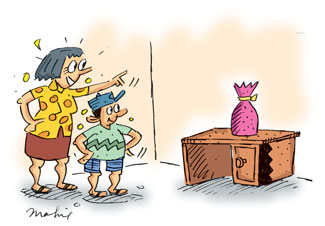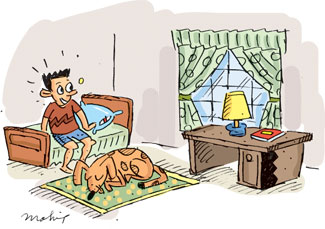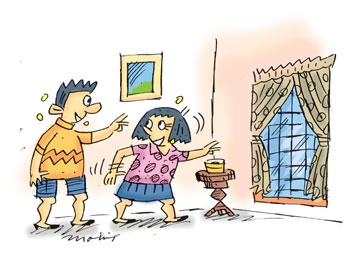|

by R. S. Karunaratne
Prepositions
of position
We use the prepositions 'at, in' or 'on' to indicate where we live.
If we want to indicate the address we use 'at'.
Nethmi lives at 98, Kaviraja Mawatha, Panadura.
The minister's office is at 310, Downing Street, Colombo 13.
Are you still at 35, Mirihana Road, Nugegoda?
|

What is on that table? |
We are residing at Kokila Road, Moratuwa.
There is a government office at 235, Welikada Road, Rajagiriya.
We use 'in' to state a village, town, city or country we live in.
Amithab Bachchan lives in India.
Azar is holding a sathyagraha in New Delhi.
A lot of rich and powerful people live in Colombo.
Diyawadana Nilame resides in Kandy.
The Public Library is in Colombo 7.
We use 'on' to state the floor or level of the apartment or flat we
live in.
The Fernandos live on the third floor of Central Towers.
The operation theatre is on the tenth floor of the hospital.
Triumph company is on level 39 of the building.
The gym is on the 9th floor.
There is a cafeteria on the first floor.
We usually place the preposition before a noun.
The meeting is at the Garden Hotel.
The wedding is at the Lounge.
|

The dog is lying on the carpet in my room. |
We were travelling in the bus.
Do not travel on the foot-board.
What is on that table?
We can place a preposition before a noun phrase.
The dog is lying on the carpet in my room.
The bird is on the window sill of the main hall.
Your dictionary is on the top shelf of that cupboard.
Sara is in her grandfather's apartment.
I stood on the table to hang the picture on the wall.
We can place a preposition before a pronoun.
Keep all your money in it.
She bought a chair and sat on it.
We have faith in him.
Don't step on it!
Keep a tab on her.
Activity
Fill in the blanks with 'in, on' or 'at'. Check your answers with the
key.
1. I'll meet you .............. the entrance.
>2. Senthil has got a pain ............... his back.
3. Look at the heap of newspapers ............ my table.
4. Neela is sitting ............. the table.
5. Put the eggs back ............ the fridge.
6. What's going on ............. your head?
7. The dog is sleeping ............... the bottom of the stairs.
8. I've got something ................ my eye.
9. Eva is still ............ bed.
10. He came and fell ........... his mother's feet.
Key
1. at 2. in 3. on 4. at 5. in 6. in 7. at 8. in 9. in 10. at
Guessing game
Can you guess the meaning of the words in Column 'A' from those in
column 'B'? Check your answers with the key.
[Column A]:
1. Abase
2. Abduct
3. Bachelor
4. Backpack
5. Callow
6. Carnivore
7. Deadpan
8. Deathly
9. Eccentric
10. Entreat
11. Feat
12. Fireman
13. Gloom
14. Goon
15. Harbinger
16. Hangman
17. Ignominy
18. Impel
19. Jinx
20. Jolly
21. Killjoy
22. Kinetic
23. Laze
24. Leap
25. Magnitude
[Column B]:
A. lower oneself in dignity
B. to take somebody away illegally
C. a person who spoils the enjoyment of others
D. the great size of something
E. to jump high
F. like or suggesting death
G. an achievement needing skill
H. partial darkness
I. of or produced by movement
J. an animal that eats meat
K. with no expression or emotion
L. not conventional
M. a man who is not married
N. to beg
O. a member of a fire brigade
P. rest
Q. a stupid or crazy person
R. a large bag carried on the back
S. person whose job is to hang criminals
T. public shame or disgrace
U. to force somebody to do something
V. not mature or experienced
W. bad luck
X. happy and cheerful
Y. a sign that something will happen soon.
[Key]
1. A 2. B 3. M 4. R 5. V 6. J 7. K 8. F 9. L 10. N 11. G 12. O 13. H
14. Q 15. Y 16. S 17. T 18. U 19. W 20. X 21.C 22. I 23.P 24.E 25.D
Starters :
Use of ‘shall’
and ‘will’
We use ‘shall’ for the first person singular and plural.
I shall meet you on Monday.
I shall do it the way you want.
Shall I bring my camera?
I shall not fail to write the essay.
Shall I bring a friend of mine?
Shall we go on a picnic?
|

Shall I open the window? |
Shall we follow this course?
We shall be able to meet you.
We shall not fail to help you.
Shall we start the lesson now?
We use ‘will’ for the first person, second person and third person.
It can be used for both singular and plural.
Demi travels a lot with her new-born baby. She will be in Jaffna
tomorrow.
Next week Demi will be in London.
You can telephone me this evening. I’ll be at home.
Leave the parcels at the railway station. Harry will collect them on
his way home.
I will probably meet him at the library tomorrow.
Will you be in office this evening?
We use ‘will not’ or ‘won’t’ for the future to express a negative
idea.
Lal won’t sit for the examination this year.
Don’t phone me this evening. I won’t be at home.
I am on leave. I won’t be able to meet you in office.
The children won’t sleep because they are watching a cartoon film.
We often say ‘I think...will ......’ in sentences.
I think David will win the local government elections.
I don’t think he will help you.
Do you think the examination will be easy.
We think the minister will solve all our problems.
We do not use ‘will’ for things we have already arranged to do or
decided to do.
On such occasions we use the ‘going to’ form.
We are going to hold an exhibition of paintings at the art gallery.
Are you going to work tomorrow?
I am going to buy a car this month.
She is going to get married soon.
He is going to buy a coconut estate.
In modern English we use ‘will’ with the first, second and third
persons.
I will meet you tomorrow.
We will cancel the meeting.
She will not do it the way we want.
He will be the next principal of our school.
You will not be happy in that country.
We do not use ‘shall’ with ‘you, they, he, she, it’.
We use ‘I think I’ll’ when we decide to do something.
I think I’ll go to the gym in the evening.
I think I’ll pass the examination.
I don’t think I’ll pass the examination.
I think I will get a teaching appointment next month.
I don’t think I’ll be able to help him.
‘Shall I’ and ‘shall we’ are used to ask questions.
Shall I open the window?
Shall we dance?
Shall we go for a walk?
Shall I come with you?
Shall we swim across the river?
One word for many
Give one word for each of the definitions from the list of words
given below.
Check your answers with the key.
Firebrand, factotum, extrovert, driver, economist, strategist,
opthalmologist, accompanist, satirist, misogamist, rationalist,
psychologist, biologist, opportunist, philatelist, geologist,publicist,
herbalist, chiropodist, fatalist
1. One who accepts all that happens as inevitable
...........................
2. A hand and foot doctor ............................
3. One skilled in the use of medicinal plants........................
4. One who writes on social and political matters
..........................
5. One who studies the science of the Earth’s crust
...........................
6. One who collects stamps ...........................
7. One who takes advantage of prevailing circumstances
......................
8. One who studies the science of physical life
...........................
9. One who studies the science of human behaviour
...........................
10. One who founds his belief entirely on reason
............................
11. One who hates marriage ............................
12. One whose writings expose or ridicule vice or
folly......................
13. One who plays an instrument while another sings
........................
14. An eye specialist ............................
15. One skilled in the art of war ......................
16. One skilled in the principles of production and distribution of
goods and services and in the development of we
.........................
17. One who drives a vehicle .......................
18. One who is cheerful and attracts the attention of
.......................
19. One who is employed to do all types of work
.............................
20. One who is very active in social and political affairs and is
thought by others to be causing trouble ..........................
Key:
1. fatalist 2. chiropodist 3. herbalist 4. publicist 5.geologist 6.
philatelist 7. pportunist 8. biologist 9.psychologist 10. rationalist
11. misogamist 12. satirist 13.accompanist 14. opthalmologist 15.
strategist 16. economist 17. driver 18. extrovert 19. factotum 20.
firebrand |

